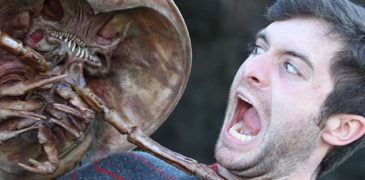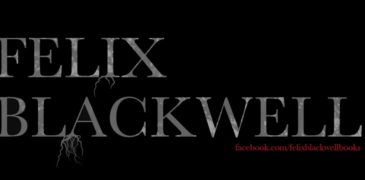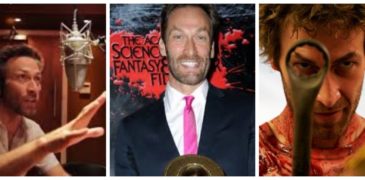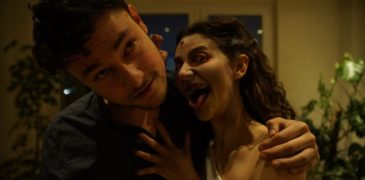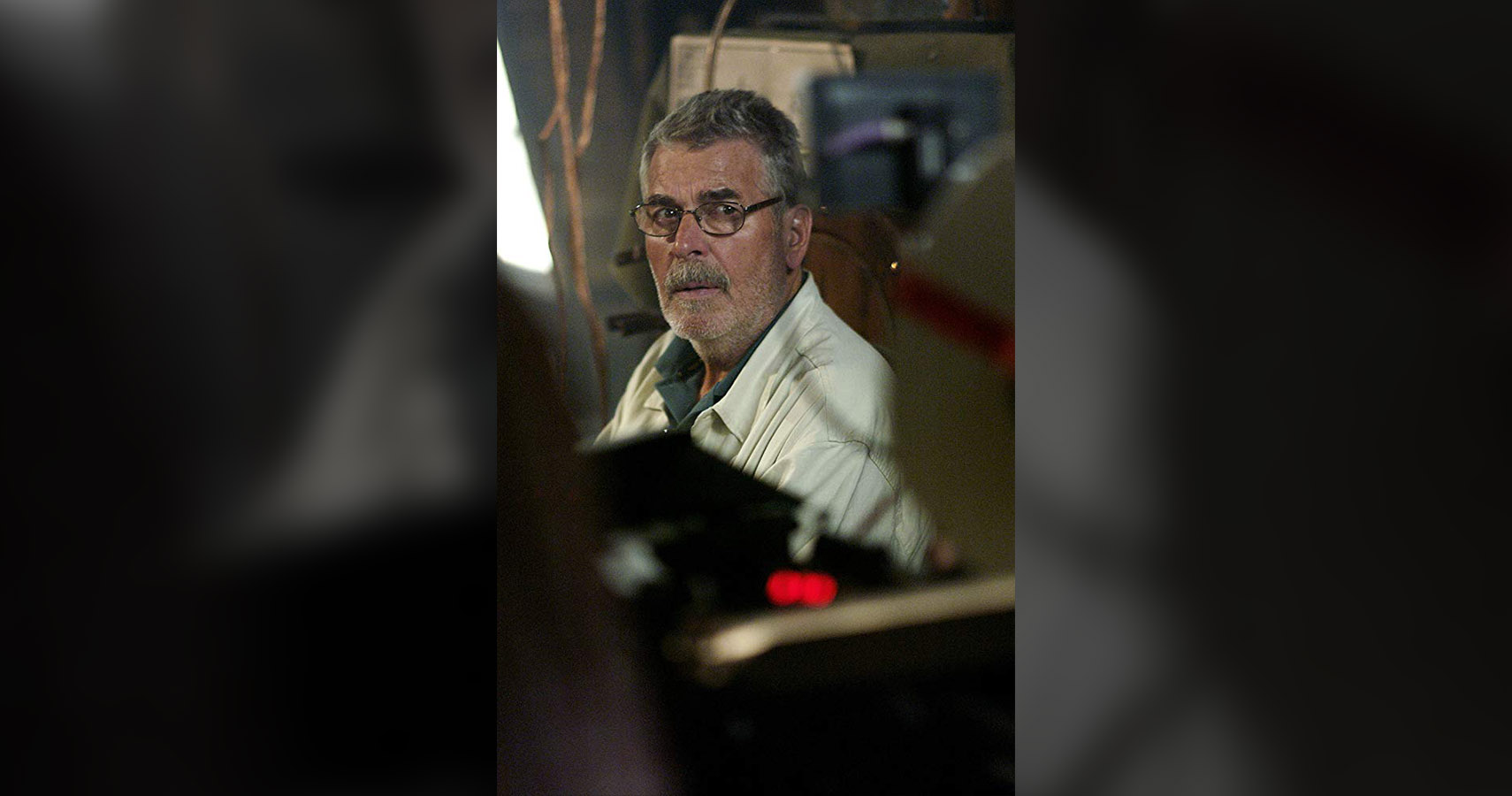
Most notable as the director behind the smash-hit horror comedy, Motel Hell, Kevin Connor is an English director born in King’s Cross, London. Beginning his career as an assistant film editor for British Films Ltd., his directorial break came from Amicus Films producer, Milton Subotsky, with the horror film – Tales from Beyond the Grave (1974). Since then, he has directed over 70 feature-length titles, as well as TV Movies and series, such as The Land That Time Forgot (1974), Episodes of Wizards and Warriors (1983), Diana: Her True Story (1993), and, of course, Motel Hell (1980).
We were lucky enough to get the chance to chat with Kevin and ask about his illustrious career as well as his work on Motel Hell.
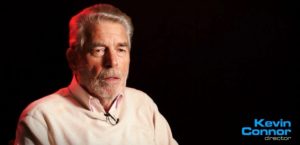
When and how did you become interested in films?
I was fortunate in as much that knew I wanted to get into the film industry at an early age. At school in the 50’s my Art teacher put up a flyer on the classroom wall that depicted jobs in the film industry – this particular one had a photograph of a director and cameraman swinging high over a crowd on a monster crane. ‘That’s what I want to do’. I had never realized that there were actual ‘jobs’ in the industry.
The moment that my ambition was cemented was actuated by an occasion that took place one evening near my home in Hertfordshire, England. During the war (1945) the Americans had built a hospital not far away to accommodate the wounded soldiers of the D-Day landings. It fell into disrepair over the years but one evening in 1951, I spotted a large glow of light coming from the vicinity of the old hospital. So being nosey I cycled down toward the site – and lo and behold – the American hospital had been turned in to Belsen Concentration Camp!! There were snarly Alsatian dogs on leashes – German Nazi Guards pushing and shoving inmates that were trudging through the infamous gates with their suitcases and bundles. A film set at night is magic – all-be-it a terrible moment in history being re-enacted.
I was well and truly hooked on a career in the film industry. I wrote over a 100 letters to every company in the London Telephone Directory asking for a Trainee job on the cameras. I had few replies but one led to being a Trainee Film Editor in the cutting rooms in London’s Soho.
I had a foot in the door – not on a magical camera crane unfortunately, but learning the craft of editing turned out to be a very fortunate department to be in…..
Could you tell us how Motel Hell began? How did the project begin?
I had directed several films in the UK (‘Land That Time Forgot’/’People That Time Forgot’/’At The Earth’s Core’etc.) – and I thought ‘it’s time to have a go at Hollywood.’ Like Everest – it’s there – if I fail – then so be it – if I get lucky then great! So, I came to Los Angeles with only two contacts – an agent and a manager. After several weeks I wasn’t really getting anywhere so I called the agent to see if had viewed my ‘directors reel’ – his assistant said: ‘Oh, it’ll be waiting in the office on the desk for you to collect! Oh well that’s that I thought. So, I went into his office in Beverly Hills, and just as I walked into the reception, his office door opened and out he came – ‘Hi Kevin – how’s it going??’ ‘Nothing yet’ says I. “Come in here – I’ll get you a job…’
We sat down, and he picked up the phone, called another agent: ‘Have you got anything for a young director? ’ The answer was: ‘Yes’ Has he directed a horror film?’ ‘Yes’, I signaled thumbs up. ‘Have him come over and meet. I’ll give him the script to read — the script was Motel Hell!! Talk about luck – if I had walked in 5 minutes earlier… my Hollywood career would possibly never have happened…
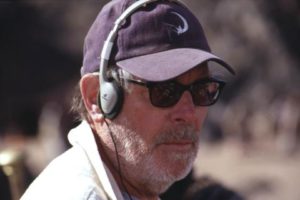
Did you want to add touches of humor to the screenplay?
Well, I took the script back to my very small one–bedroomed apartment and started to read it – the opening shot:
EXT MOTEL HELL – NIGHT (Establishing)
INT MOTEL HELL – NIGHT
A fat woman is in bed with a pig and a dildo……
I threw the script on the floor. ‘This what I came to Hollywood for!!! @#$%…’. Wisely, I picked it up and finished it and took my ideas to the two young producers at UA. I suggested that we get rid of the juvenile stuff and ‘if you would consider creating more dark humor – and play it absolutely straight – then I’d love to direct’. To their credit and my relief, Robert and Charles agreed, and reworked the script very quickly.
Any favorite horror films?
Of course, Hitchcock’s ‘Psycho’ first and foremost. Along with ‘Get Out’/Alien/The Exorcist/The Others/Repulsion – just a few..
How did you select the actors for the film?
I seem to remember going to meet Harry Dean Stanton soon after signing up for the film. However, he passed on us, but as luck would have it we met soon after with Rory Calhoun who was absolutely the perfect image. We had a wonderful casting person on board understood the tone of the film and brought us Nancy Parsons. A formidable actor. Rory and Nancy made the perfect ‘American’ couple I envisaged. All the actors that were auditioned were spot on. I knew very few American actors – some by watching American tv in the UK. IE Paul Linke from CHiPS. The only actor I knew and had worked with was John Ratzenberg who I came across in the UK and had cast him in two of my films Land That Time Forgot and People That Time Forgot. I was blessed with having two enthusiastic producers and crew.
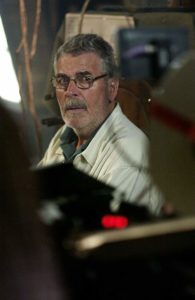
What was the feeling on the set?
I always try to create a happy atmosphere on my sets. Shooting with an American crew is almost the same as shooting in the UK. The mechanics of film production and shooting are the same the world over. The crew accepted me wholeheartedly and I never felt any animosity being a lone Brit and coming over to Hollywood. Everyone enjoyed working on such a bizarre subject matter and approached every aspect with such professional attention and detail – it was a really happy experience for my first Hollywood film.
Was Motel Hell compared with The Texas Chainsaw Massacre?
Well, it’s inevitable that the two films would be compared because of the chainsaw fight at the end of Motel Hell. [The Texas] Chainsaw Massacre was a really gory and frightening film. However, I wanted to not depict blood and gore at all and leave what as about to happen by cutting away from ‘a knife going up to the throat ‘ – to a peaceful country side shot with birds tweeting and blue skies. I think it’s just as effective as showing the violence for real.
In one way it was the end of those dark-humored and visually non-violent films of the British kind that I been brought up on.
I’m very fortunate that it has become quite a cult film these days and I receive many letters and compliments from all over America.
This interview was provided to Grimoire of Horror by John Wisniewski
More Interviews
Writer/Director Pierce Berolzheimer made a show-stopping debut at this year’s Arrow Video FrightFest with the world premiere of his first feature: Crabs!. The film is a wonderfully crafted love letter… Every indie creator hopes to make it big some day, but with limited marketing budgets and the lack of a big publisher/production company backing their projects, success is often a… When I finished watching Dave Made a Maze (2017) last year, I was in awe. (Read my review of the movie here.) So few movies involve this level of creativity… Kevin Kopacka is a name that horror fans around the world will no doubt become very familiar with. After having his latest film, Dawn Breaks Behind the Eyes, screened at…Interview with Pierce Berolzheimer – Director of Crabs!
Interview with Felix Blackwell, Best Selling Author of Stolen Tongues
Interview with Bill Watterson – Actor, Writer and Director of Dave Made a Maze
Interview with Filmmaker Kevin Kopacka – A Jack of all Trades with a Knack for Stunning Visuals

